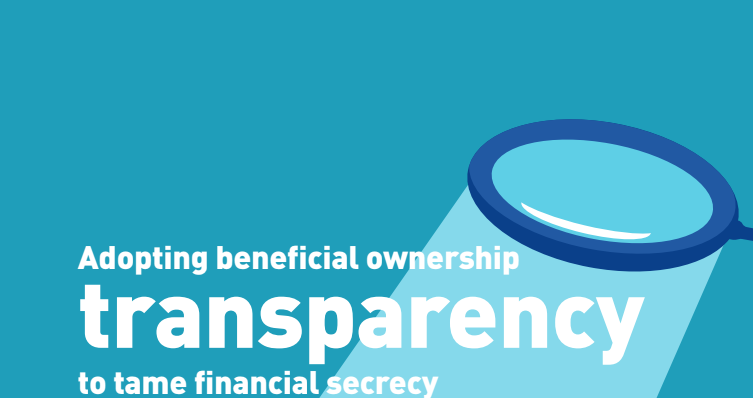Adopting beneficial ownership transparency to tame financial secrecy

Several African states have taken steps to curb financial secrecy by adopting beneficial ownership transparency where the ultimate owners of an entity such as a business, are disclosed through a central public registry. The ultimate owners are natural persons who ultimately have the right to some share of a legal entity’s income or assets, or the ability to control its activities.
With the visibility of beneficial ownership growing in Africa, the Tax Justice Network and Tax Justice Network Africa conducted a study on the State of Play of Beneficial Ownership Registration in Africa. From the report, 23 of the 54 African nations as of the beginning of 2023, have laws and regulations mandating the actual beneficial owners of legal entities to reveal themselves to a governmental body.
More than half of the continent has pledged to publicly reveal the beneficial owners in fields like public procurement and the extractive industries that are prone to fraud and corruption. A key tactic used by African governments to combat illegal money flows is removing the cloud of secrecy that surrounds the owners of corporations, partnerships, trusts, and foundations.
In the report issued by the High-Level Panel on Illicit Financial Flows almost 10 years ago, the African Union and the United Nations Economic Commission for Africa emphasized the significance of beneficial ownership disclosure to stem illicit financial flows. Beneficial ownership transparency aids tax authorities in identifying plans set up to evade and avoid paying taxes, combating tax fraud, money laundering, corruption, and financing of terrorism.
Although there are currently gaps in these international standards, African countries are still required to adhere to the Financial Action Task Force Recommendations 24 and 25 on Anti-Money Laundering and Combating the Financing of Terrorism and have strict beneficial ownership disclosure requirements.
The report examines in greater detail the 18 African countries that have been covered by the Financial Secrecy Index 2022 from the Tax Justice Network. On the other hand, it provides that money laundering, tax fraud, and other wrongdoing are all made possible by financial secrecy, which also erodes everyone’s entitlement to human rights. The Financial Secrecy Index ranks the countries and territories that are most involved in assisting people to conceal their financial affairs from the law. On the Financial Secrecy Index, jurisdictions are ranked according to their Financial Secrecy Index Value, which is a gauge of how much financial secrecy they provide to the world. This value is derived from the Secrecy Score and the Global Scale Weight, two metrics that combine qualitative and quantitative data.
In 12 of the 18 African jurisdictions assessed in the Financial Secrecy Index, legal persons (companies, foundations, and some partnerships) and/or legal arrangements (trusts) are required to register their beneficial owners. Egypt, Ghana, and Kenya only require companies to register while Botswana, Morocco, Namibia, Rwanda, Seychelles, Tanzania, and Tunisia mandates both legal persons and trusts to do so.
Beneficial Owners Registration requirements
The report further outlines the conditions that should be met before registering an entity’s beneficial owners. These are:
- Local incorporation, formation, or governance in accordance with local law.
- Possessing resources, assets, or activities in that country.
iii. A participant, such as a director, legal owner, beneficial owner, or settlor, who resides in the nation
Despite these conditions, Egypt, Kenya, Namibia, Nigeria, Rwanda, Seychelles, and Tanzania only consider local incorporation as the prerequisite for registering beneficial owners. Although this is a significant step, it does not ensure complete transparency. Instead, it means that a large number of foreign corporations can operate in the country, amass assets there, or generate money without having to reveal to local authorities who are truly gaining from them. The dangers are great. It undermines economic competition for domestic players and shrouds offshore businesses in secrecy, making it more difficult to collect taxes, conduct audits, and conduct investigations.
In the majority of African nations, the commercial register is where beneficial ownership data is gathered and stored. Due to its importance, the report states that the ownership information should be regarded as a public good. Only Nigeria, out of the 18 African countries evaluated by the Financial Secrecy Index, currently allows the public access to information on beneficial ownership.
The report deems registration of beneficial owners to be effective when:
- Every domestic company registers each of its beneficial owners.
- The definition of a beneficial owner includes at least one of the following three elements; ownership, benefit, or control.
iii. Beneficial ownership information is readily available online for free (no fee or charge) and in an easily copiable format.
- The online information includes at least the name of the beneficial owners and either their address, date of birth, or national identification number.
- If thresholds are used in the definition, they are not higher than the “more than 25%” threshold.
- The information is updated at least annually
Africa keeps advancing toward beneficial ownership transparency, however, there are still openings that dishonest individuals might take advantage of. More needs to be done to advance beneficial ownership transparency.

